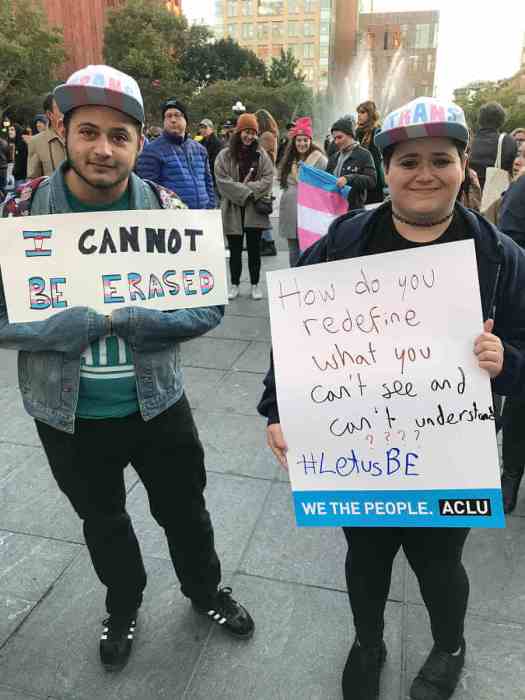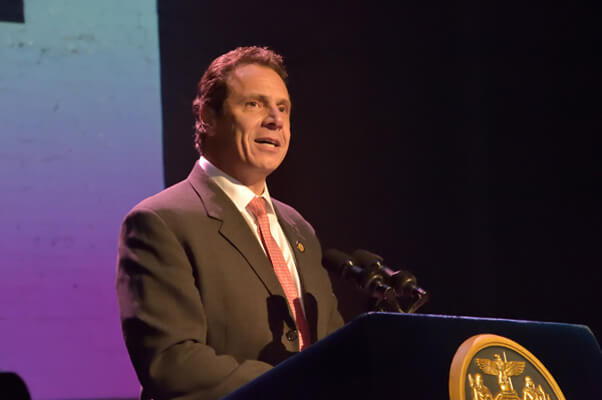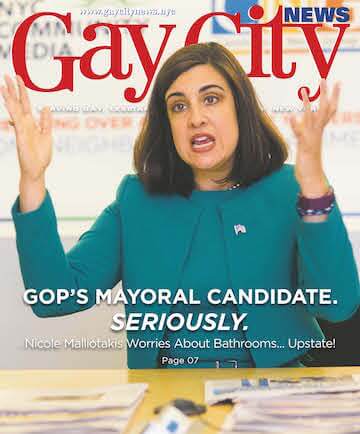ILLUSTRATION BY MICHAEL SHIREY
Even LGBT New Yorkers who vociferously resist identity politics and being labeled one-issue voters must contend with the compelling case for Governor Andrew Cuomo’s reelection made by his extraordinary leadership on marriage equality. It might be easy to shrug off that challenge given there is no doubt he will win a second term on November 4. But at election time, it’s appropriate to evaluate Cuomo’s track record to date and to articulate the goals we should hold him to over the next four years.
Gay City News Endorsement
First, on marriage equality. In 2014, with gay marriage in place in 32 states, it might be tempting to downplay Cuomo’s 2011 accomplishment. That is a mistake.
Gay marriage took a thrashing in the New York State Senate in December 2009, in a 38-24 adverse vote, with eight Democrats among those saying “no.” To be sure, the community mobilized quickly to respond in the strongest way possible — by defeating three opponents (two in Queens, one in Buffalo; two Democrats and one Republican) by the time the 2010 elections were over. Those results dramatically demonstrated LGBT political clout and sophistication, but threading the needle to get to 32 votes took additional muscle and no small amount of political finesse.
Any careful reading of the successful June 24, 2011 Senate vote on marriage casts significant doubt on whether the result would have been possible without Cuomo’s hands-on marshaling of the political assets at hand. Prior to New York, only five states had marriage equality. Though several states got there through legislative enactments, Cuomo was the first governor to lead a fight to win marriage from a Republican-controlled legislative chamber. He personally organized and disciplined the advocates, enforced party unity among Democrats, and alternately courted and put pressure on the Senate’s majority Republicans. He deserves enormous credit for the victory.
The governor has other laudable achievements to his credit — the strengthening of gun control laws, taking the initial steps in bringing the state’s minimum wage up toward an adequate living standard, and rationalizing the chaotic budget approval process that for decades had run well past the April 1 deadline.
Cuomo’s administration moved out ahead of New York City in making it less onerous for transgender folks to take care of a vital need — changing the gender designation on their birth certificates. The state also moved more aggressively than Mayor Bill de Blasio’s team in embracing AIDS advocates’ call to establish a plan for making 2020 the target date for ending HIV transmission as an epidemic in New York. In a recent appointment to the state’s highest court, the governor replaced a sitting judge whose votes had been hostile to LGBT rights with a lower court veteran with a promising and progressive record.
As the September 9 primary results made clear, however, a good many Democrats are frustrated, even disillusioned with Cuomo — on issues from tax policy to fracking. Nothing has been more damaging to the governor’s credibility than his handling of his Moreland Commission on public corruption. Cuomo arrived in the governor’s office promising to clean up Albany’s lamentable ethics. Pulling the plug on Moreland and saying he was satisfied with what was a very modest set of reforms out of the Legislature, he let political expediency trump governmental transparency. Cuomo may well have the right legal arguments about his disbanding of Moreland, but the ethics and optics had nothing to do with bringing sunshine onto the workings of state government.
The Moreland episode points up a potential Achilles heel in the Cuomo style of governance. He keeps tight control of those issues he cares about. And there’s no doubt that controlling the process is important in achieving the right results. That was abundantly clear in the marriage fight. At the end of the day, voters care about results. But they have a right to demand that government also be open and that elected officials — a shocking parade of whom have been indicted and convicted over the years in Albany — are honest. The policy outcomes here in New York are nowhere near good enough to mount a persuasive “ends justify the means” argument, if that were ever acceptable. Defeating public corruption very much remains on the to-do list.
For the LGBT community, the most glaring piece of unfinished business is the Gender Expression Non-Discrimination Act, stalled now for nearly 12 years. After the Senate’s Republican-Independent Democratic Conference coalition this June once again failed to allow a vote, conventional wisdom among advocates was that a Democratic Senate needed to be elected in November. That now looks like a high hurdle in next Tuesday’s vote. Should Democrats fall short, some will complain Cuomo did not sufficiently lean into that cause, but, with three incumbent Democrats in serious trouble and a Long Island candidate for an open seat bailing out in the face of ethics charges, there’s plenty of blame to go around among party leaders and activists.
Whatever the outcome next week, Cuomo needs to demonstrate greater leadership on GENDA. When it’s been important to him, he’s found ways to work with the Senate Republicans — and GENDA should be important to him. His recent reaffirmations of support for the measure and for a bill barring sexual orientation conversion therapy for minors are encouraging on that score, but, as he knows, results matter. The community will also look to the governor as it aims for additional goals — like reform of surrogacy and other gay family laws and greater funding for LGBT homeless youth.
Emphasizing that he and Democratic Senate candidates support his commendable push for the Women’s Equality Act, Cuomo has created a new Women’s Equality Party ballot line — though a number of the down-ballot candidates, which it was presumably created to help out, have not delivered sufficient petitions to qualify. The entire effort has been misguided — and just might have been intended to diminish the influence of the Working Families Party, which made the governor sweat for its nomination this year.
For more than a decade, however, the Working Families Party has played a positive role in pressing the Democratic Party to embrace progressive issues, including on women’s and LGBT rights. We urge a vote next Tuesday on the Working Families ballot line for Governor Andrew Cuomo and New York’s other two statewide elected officials, both with long and strong LGBT rights records — Attorney General Eric Schneiderman and Comptroller Thomas DiNapoli.


































